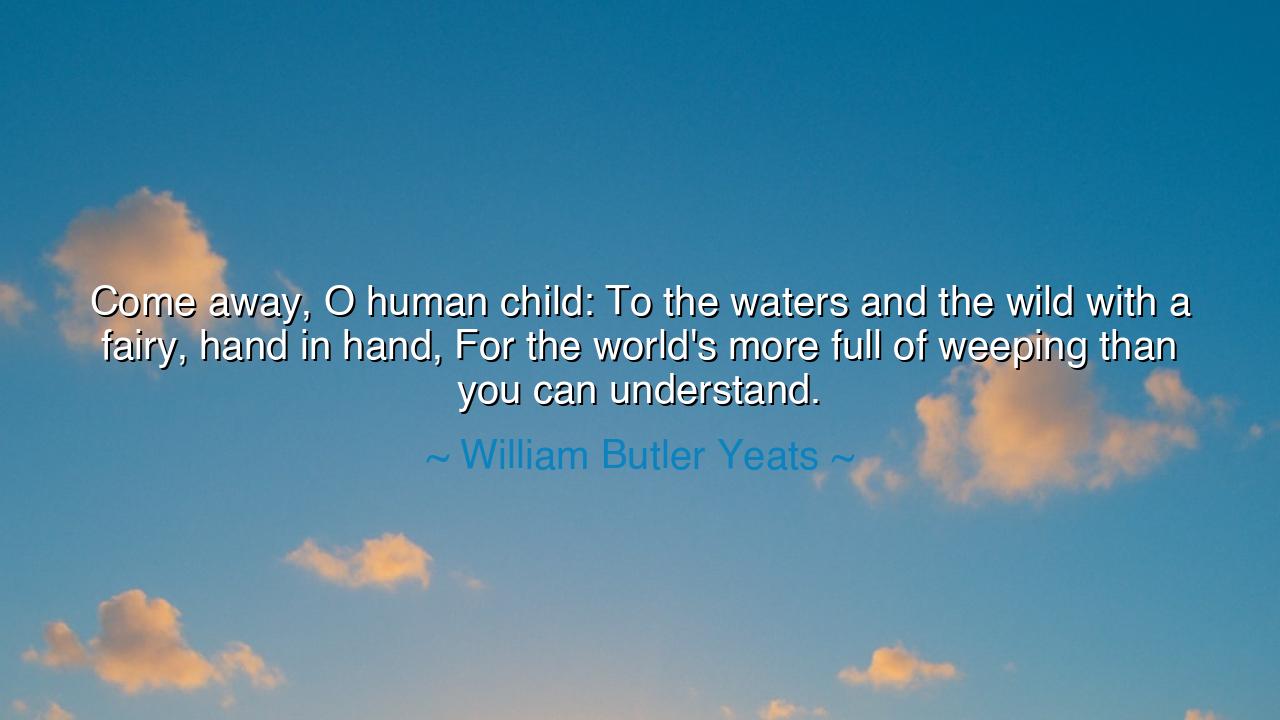
Come away, O human child: To the waters and the wild with a
Come away, O human child: To the waters and the wild with a fairy, hand in hand, For the world's more full of weeping than you can understand.






"Come away, O human child: To the waters and the wild with a fairy, hand in hand, For the world's more full of weeping than you can understand." These evocative words by William Butler Yeats invite us into a mystical realm, one where the world’s sorrow is momentarily forgotten and the childlike joy of fantasy and nature can take root. The image of the fairy guiding the human child to the waters and the wild speaks to a profound longing to escape the weight of life’s sorrows and to find solace in the purity and wonder of the world around us. Yeats, through this line, calls us to remember the importance of embracing both the beauty and mystery of life, especially in a world that is often overwhelmed by sorrow.
In the ancient world, there was an understanding that life, though fleeting and full of suffering, also held moments of beauty that could be discovered through the embrace of nature and the supernatural. The Greeks, with their pantheon of gods and creatures, understood that the world was both harsh and full of wonder. To seek the wilds—to venture into the forests and mountains, or to commune with the gods and spirits—was to open oneself to both the dangers and the awe of existence. Yeats taps into this idea by inviting the child away from the harsh realities of the world to explore the unknown with a fairy—a symbol of magic, mystery, and purity. In this way, Yeats connects us with the ancient belief that weeping, the sorrow of the world, is but one side of the coin, and that joy and escape from it are sometimes found in the embrace of the unknown.
Consider the tale of Persephone, the daughter of Demeter who was taken into the underworld, leaving her mother to weep for her in a long season of sorrow. Yet in the darkness of the underworld, Persephone found not only grief but also a kind of power and rebirth. She was torn between two worlds: one of sorrow, the other of mystical growth. The Greek myth captures the duality of Yeats’ sentiment: the world is indeed full of sorrow, but it is also full of secrets and wonders that remain hidden until we are ready to seek them out. Just as Persephone embraced her new realm, so too must we embrace both the tears and the beauty of life, knowing that both are inseparable parts of the journey.
In the modern world, we see this dance between sorrow and wonder played out in the stories of those who have faced immense hardship and yet found a sense of purpose or peace through connection with the natural world or the spiritual realm. Consider Viktor Frankl, the psychiatrist and Holocaust survivor who found meaning in his suffering by seeking deeper understanding through his connection with others and with his inner self. His experience of enduring unimaginable sorrow in the concentration camps led him to discover that meaning could still be found amidst the pain. Yeats’ words echo this truth: even when the world is filled with sorrow, there is always a place to go—whether through nature, spirituality, or art—that can offer a glimpse of healing.
The invitation in Yeats’ quote is both romantic and practical. It speaks to the soul’s longing to be free from the weight of worldly sorrow. When life feels overwhelming, it is easy to forget that there are spaces where the spirit can roam freely and find solace. Yeats calls us to escape, not in denial of the world's suffering, but in recognition that joy and wonder are also a part of existence. Just as a child would follow the fairy into the wild, we too must sometimes step away from the noise of life and listen to the whispers of the world’s magic—whether through nature, creativity, or connection to something greater than ourselves.
This brings us to the key lesson of Yeats' words: sorrow and beauty coexist. Yeats does not promise an escape from suffering, but rather a companion to help us face it. The fairy is not just a fantastical being, but a guide—showing us that we can find joy in places we may not expect. The waters and the wild are metaphors for the purity and simplicity of life, where sorrow is momentarily quieted and the soul can breathe. Life’s true meaning lies not in the avoidance of grief but in our ability to seek out the beauty that exists even in the shadow of sorrow.
As we move through our own lives, burdened with the weight of sorrow, we should remember Yeats’ call to escape with the fairy—to take moments to step away from the chaos and immerse ourselves in the wonder that the world offers. Seek peace in nature, in creativity, or in the quiet stillness that allows the spirit to heal. When the weight of the world feels too much to bear, we must remember that there is always a place to go where the heart can find joy amidst the sorrow. It is in these moments that we not only survive but thrive, knowing that, as Yeats teaches, the world is indeed full of weeping, but it is also full of beauty, mystery, and the possibility of transcendence.






AAdministratorAdministrator
Welcome, honored guests. Please leave a comment, we will respond soon